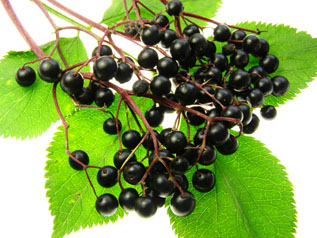Elderberry
Other Names: Sambucus nigra, Arbre de Judas, Baccae, Baises de Sureau, Black-Berried Alder, Black Elder, Black Elderberry, Boor Tree, Bountry, Elder, Common Elder. Elder Berry, Elderberries, Elderberry Fruit, Ellanwood, Ellhorn, European Alder, European Black Elder, European Black Elderberry, European Elderberry, European Elder Fruit, European Elderberry, Fruit de Sureau, Grand Sureau, Hautbois, Holunderbeeren, Sabugeuiro-negro, Sambequier, Sambu, Sambuc, Sambuci Sambucus, Sambucus nigra, Sambugo, Sauco, Saúco Europeo, Schwarzer Holunder, Seuillet, Seuillon, Sureau, Sureau Européen, Sureau Noir, Sus, Suseau, Sussier.
See also : Elderflower
Contents
Special Precautions of Elderberry
- While elderberries are often used as a medicinal plant and found in homeopathy remedies to treat skin wounds and colds, the leaves, twigs and seeds contain a deadly chemical related to cyanide, which can cause severe illness and nausea if ingested. While some varieties are safe to eat, those that aren’t ripe or cooked properly can cause diarrhea and seizures.
- Consume them only when they are cooked, as uncooked berries contain toxins which may lead to vomiting and nausea.
- Drinking around 10 ounces of Elderberry juice per day is said to be most beneficial. Larger doses can lead to diarrhoea, so they should be consumed with care.
- Be sure to only use Elderberries when they are blue, black or purple and to avoid them when they are red.
- The green parts of the plant, the leaves and bark are also to be avoided, as they may contain cyanide.
Actions
- Flower: diaphoretic, anticatarrhal, antispasmodic.
- Berry: diaphoretic, diuretic, laxative.
- Leaf: diaphoretic, diuretic, emmolient, vulnerary, expectorant.
The benefits of Elderberry are
Elderberries are primarily found in North America and Europe. Many nutrients can be found in Elderberries, among them flavonoids, amino acids, tannin, carotenoids, Vitamins, C, A and B, rutin, organic pigments, viburnic acid and lectins. These berries have been used for many years as a folk remedy for different illnesses and conditions.
- antiviral properties, especially against different strains of influenza virus : In 1995, Elderberry juice was used to treat a flu epidemic in Panama. Scientists even used these powerful berries to help treat AIDS and cancer and "one study suggested that elderberry could kill the H1N1 virus."
- Research has shown that they are effective in treating many conditions, among them flu, tonsillitis, diabetes, asthma, yeast infections, viral infections, chest and nasal congestion and constipation.
- to prevent cardiovascular disease by reducing the oxidation of LDL cholesterol in the blood. Anthocyanins, one of the most powerful antioxidants known to man, are found in these remarkable berries in far higher quantities than either Vitamin C or E. Their juice is also known to help night vision and improve digestion. Infusions of Elderberry are said to be good for back pain, nerve disorders and reducing inflammation in the urinary tract and bladder.
- People who had flu and consumed Elderberry juice reported less severe symptoms than those who did not. They also recovered substantially faster. The quercetin contained in Elderberries is believed to be responsible for the therapeutic effects of these berries.
- Immunological Disorders : boost immunity by increasing the body's production of cytokines (proteins involved in regulating the immune system's response to disease and infection). Hasassah`s Oncology Lab in Israel has determined that the immune system is stimulated by Elderberries to the point where they have treated their AIDS and cancer patients with them.
- Preventing cancer : Source of Cyanidin.
Main Combinations
- Nose, throat and ear disorders, recurring winter ailments: Echinacea + South African Geranium + Elderberry
- Prevention of nose, throat and ear disorders, recurrent winter ailments: Goji Berry + Echinacea + South African Geranium + Elderberry
Medical Disclaimer
This information is not meant to be substituted for medical advice. Always consult a medical professional regarding any medical problems and before undertaking any treatment or dietary changes.
